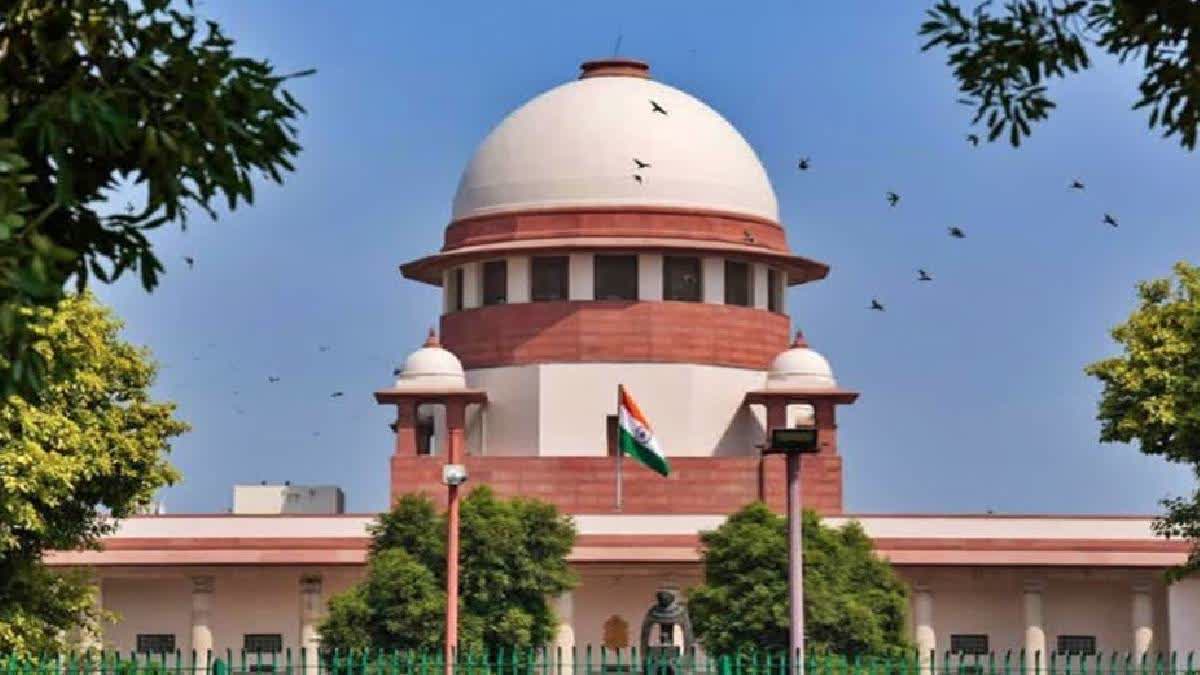New Delhi:The Supreme Court on Monday said the concept of secularism represents one of the facets of the right to equality, intricately woven into the basic fabric that depicts the constitutional scheme's pattern, while dismissing a batch of pleas against inclusion of the words “socialist” and “secular” in the Preamble to the Constitution through the 42nd Constitutional Amendment in 1976.
A bench led by Chief Justice of India Sanjiv Khanna and Justice Sanjay Kumar said a number of decisions of this court, including the constitution bench judgments in Kesavananda Bharati v. State of Kerala (1973) and S R Bommai vs Union of India (1994), have observed that secularism is a basic feature of the Constitution.
The bench said the ‘secular’ nature of the state does not prevent the elimination of attitudes and practices derived from or connected with religion, when they, in the larger public interest impede development, and the right to equality. “In essence, the concept of secularism represents one of the facets of the right to equality, intricately woven into the basic fabric that depicts the constitutional scheme's pattern”, said the bench.
The bench said the pleas were filed in 2020, forty-four years after the words ‘socialist’ and ‘secular’ became integral to the Preamble, making the prayers particularly questionable. “This stems from the fact that these terms have achieved widespread acceptance, with their meanings understood by ‘We, the people of India’ without any semblance of doubt”, it said.
The petitioners’ challenge was on various grounds, namely, retrospectivity of the insertion in 1976, resulting in falsity as the Constitution was adopted on the 26th day of November 1949. The petitioners’ said the word ‘secular’ was deliberately eschewed by the Constituent Assembly, and the word ‘socialist’ fetters and restricts the economic policy choice vesting in the elected government, which represents the will of the people.
They said 42nd Constitutional Amendment in 1976, is vitiated and unconstitutional as it was ‘passed’ during the Emergency on November 2, 1976, after the normal tenure of the Lok Sabha that had ended on March 18, 1976. Therefore, it is argued that there was no will of the people to sanction the amendments.
The apex court said the additions to the Preamble have not restricted or impeded legislation or policies pursued by elected governments, provided such actions did not infringe upon fundamental and constitutional rights or the basic structure of the Constitution.
“Therefore, we do not find any legitimate cause or justification for challenging this constitutional amendment after nearly 44 years”, said the bench.
The bench said ‘secular' and 'socialist' and the word 'integrity' were inserted in the Preamble vide the Constitution (Forty-second Amendment) Act, 1976. “These amendments were made in 1976. Article 368 of the Constitution permits amendment of the Constitution. The power to amend unquestionably rests with the Parliament. This amending power extends to the Preamble”, said the bench.
The bench said the fact that the Constitution was adopted, enacted, and given to themselves by the people of India on the 26th day of November, 1949, does not make any difference. “The date of adoption will not curtail or restrict the power under Article 368 of the Constitution. The retrospectivity argument, if accepted, would equally apply to amendments made to any part of the Constitution, though the power of the Parliament to do so under Article 368, is incontrovertible and is not challenged”, it said.
The bench said while it is true that the Constituent Assembly had not agreed to include the words 'socialist' and 'secular' in the Preamble, the Constitution is a living document, as noticed above with power given to the Parliament to amend it in terms of and in accord with Article 368.
The bench said in 1949, the term 'secular' was considered imprecise, as some scholars and jurists had interpreted it as being opposed to religion. “Over time, India has developed its own interpretation of secularism, wherein the State neither supports any religion nor penalizes the profession and practice of any faith”, said the bench.
The bench said the word 'socialism', in the Indian context should not be interpreted as restricting the economic policies of an elected government of the people's choice at a given time. “Neither the Constitution nor the Preamble mandates a specific economic policy or structure, whether left or right. Rather, 'socialist' denotes the State's commitment to be a welfare State and its commitment to ensuring equality of opportunity”, it said.
The bench said, in the Indian framework, socialism embodies the principle of economic and social justice, wherein the state ensures that no citizen is disadvantaged due to economic or social circumstances. The bench said the word ‘socialism’ reflects the goal of economic and social upliftment and does not restrict private entrepreneurship and the right to business and trade, a fundamental right under Article 19(1)(g).
It stressed that this court recognized private ownership of industries, which forms a large portion of the economic structure. “The majority judgment of this court in the 9-Judge Constitution Bench in Property Owners Association and Others v. State of Maharashtra and Others (2024) has cleared any doubt and ambiguity, as it is held that the Constitution, as framed in broad terms, allows the elected government to adopt a structure for economic governance which would sub-serve the policies for which it is accountable to the electorate. The Indian economy has transitioned from the dominance of public investment to the co-existence of public and private investment”, said the bench.
The apex court’s verdict on a batch of pleas filed by Balram Singh, former Rajya Sabha MP Subramanian Swamy and others.
Also Read:
- Opposition Leaders Blame BJP For Sambhal Violence; Ruling Party Hits Back
